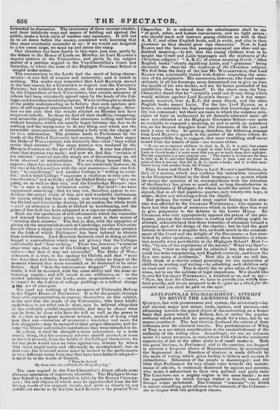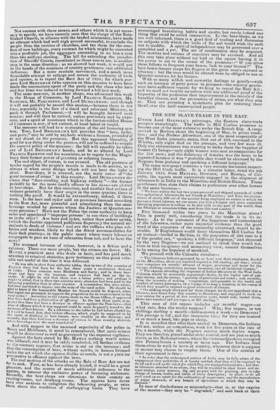ANTI-POPULAR ENCROACHMENT: ATTEMPT TO REVIVE THE LICENSING SYSTEM.
QUIETLY, but with perseverance and system, the aristocracy—lay and clerical, major and minor, lords, squires, and parsons—are advancing towards the grand object of reconstructing on a firmer basis that power which the Reform Act, or rather the popular outburst which preceded its passing, shook for a time, but by no means overthrew. The last election disclosed the extent of their influence over the electoral vassals. The predominance of Whig or Tory is a secondary consideration to the reestablishment of the authority of' the ruling class. Accordingly, we see an intimate union for many purposes, in comparison with which tile accidental superiority of one or the other party is of small moment. Both the great factions, in Parliament and in the country, are leagued to prevent a frequent choiee of Representatives, by maintaining the Septennial Act. Freedom of election is made difficult by the mode of voting, which gives facility to bribery and success to intimidation. Education of the people is discouraged ; and the little that Parliaineut for very shame votes towards the mainte- nance of schools, is cautiously disbursed by squires and parsons, who make it subservient to their own political and party ends. The Corn-laws are a mighty engine in the same hands : so are the regulations by which foreign timber is heavily taxed, and foreign sugar prohibited. The Colonial "interests "—by which is meant something quite adverse to the interests of the Colonies— are in league with the privileged classes. Not content with these means, and others which it is not neces- sary to specify, we have recently seen that the clergy of the Esta-
blished Church, in alliance with the landed aristocracy. have made
an attempt which had well nigh proved successful, to exclude the people from the vestries of churches, and tax them for the erec-
tion of new buildings, every contract for which naught be converted into a profitable job, the aggregate amounting to no less a sum than two millions sterling. The bill for extending the jurisdic- tion of Sheriffs' Courts, constituted as those courts are, is another step in the same direction : as we showed last week, it would put in the hands of the nominees of country gentlemen vast additional influence. But a more resolute movement, and a much more formidable attempt to enlarge and secure the authority of lords and squires, is to repeal the Beer Act of 1830; for which pur- pose Lord BROUGHAM (who appears on this occasion to have been made the unconscious agent of the party and the class who hate and fear him) was induced to bring forward a bill last week. The same measure, in another shape, was advocated this week in the House of Commons, by Lord FRANCIS EGERTON, Mr. SANFORD, MI. PAKINGTON, and Lord DUNGANNON; and though it will not probably be passed this session,—because there is not time, especially in the face of a timid and reluctant Ministry, to push it through Parliament,—it will be brought forward next session; and will then be carried, unless previously met by expo- sure, and a spirit of resistance which in the faction-ridden House of Commons is now, if not extinct, at least latent or torpid.
The measure will lead to a restoration of the old licensing sys- tem. True, Lord BROUGHAM'S bill provides that "beer, cyder, and perry," may he sold by anybody without a licence, provided it is not drunk on the premises. But this apparent liberality, if good for any thing under the proviso, will not be suffered to cripple the coercive policy of the measure : the bill will speedily be taken out of Lard BROUGHAM'S hands, and be so altered by Lord FRANCIS EGERTON and his associates, as to regain for the Magis- tracy their former power of granting or refusing licenses,
The real object, of course, is not avowed. The old pretence of tender regard for the people's morals is made to do service, as it always is when some design which will not bear the light is abet. Beer-shops, it is averred, are the main cause of" the great increase of crime " in this country. Lord DUNGANNON de- clares that "deer-stealing and highway robbery "—the former probably by far the more deadly offence in his eyes—are plotted in beer-shops. But for this assertion, and another that crimes of violence generally have their origin in the same quarter, there is nothing like proof. It would be extraordinary, indeed, if there were. Is the beer and cyder sold on premises licensed according to the Beer Act, more powerful and stimulating than the same beverage retailed by persons whom the Justices at Quarter-ses- sions patronize? Have not the Police the same authority to keep order and apprehend "improper persons" in one class of buildings as in the other? Are beer and cyder, rather than ardent spirits, (which the Justice.appointed publicans dispense,) the natural sti- mulants to deeds of violence ? and are the ruffians who plan rob- beries and murders, likely to find the fittest accommodation for their dark plottings, in the public resort where weary labourers congregate to pass an hour of relaxation from toil, and to hear the news?
The assumed increase of crime, however, is a fiction and a calumny. There are more people, but the crimes are fewer. Mr. HAWES, a practical man who deals in facts, and has paid much attention to criminal statistics, gave testimony on this point valu- able and useful at the time it was delivered.
" He was able to show from authentic tables, that io two of the counties of England there had been for the last three years a continuous decrease of crime. Those couuties were Middlesex and Surry ; and in them beer- shops hail been on the increase, and luxuries had been on the in. crease. It mrght be said that there was a better police ; and perhaps it might le added, that in these two counties more attention had been paid to the labouring population than in other counties. A commission, they were aware, had been appointed to inquire into the state of the rural police. He should be glad to !mow if the honourable Member for Sussex would be disposed, when that report was presented, to support the proposition for an improvement in the rural police ? According to the returns made to the Home Office, it appeared that there had been a diminution of offences. In the last three years, it ap- peared that there had been a decrease in offences against the Poor-laws—that class of offences which it was supposed could be most frequently traced to the existence of beer.houres. By a reference to the tables he had before alluded to, it would he found, first, that violent offences, which might be supposerl to be the result of drinking in beer-houses, were steadily on the decrease ; and secondly, that there had been a decrease of crimes in those country districts Where beer-shops were the most resorted to."
And with respect to the assumed superiority of the police in Surry and Middlesex, it must be remembered, that more crimes would be discovered as well as prevented by the superior vigilance.
Against the facts stated by Mr. HAWES nothing worth notice was adduced; and it may be safely concluded, till further evidence to the contrary appears, that crime is not on the increase; and that the consumption of beer, a ithout spirits, in houses licensed under the act which the squires dislike so much, is not a recu:iar provocative to offences against the laws. The real motives of the attacks on the Sale of Beer Act are not far to seek. First, as has been already hinted, it would be a great pleasure, and the source of much additional influence to the squires, to recover the exclusive power of licensing alehouses. Secondly, the beer-shops are obnoxious to their enmity as reading-rooms, not drinking.rooms. The squires have never been over anxious to enlighten the labouring people, or raise . them above the condition of clodhopping boors. They have 10
encouraged brutalizing habits and sports, but rarely indeed any thing that could be called instruction. In the beer-shops, as we are well informed, there is a good deal of reading and discussion on subjects with which the lords of the soil would wish the serfs not to meddle. A spirit of independence may be generated over a pamphlet and a pot. The art of combination may be acquired. The motives and actions of superiors may be scanned. And all this may take place without my lord or the squire having it in his power to say to the owner of the premises—" If you allow these fellows to frequent your house, look to your licence!" The beer-house-keeper straps his fingers at the great man's steward or attorney : but the case would be altered were he obliged to sue at Quarter-sessions for his licence.
With so many selfish and unworthy feelings to gratify—with such an increase of petty power in prospect—the country gentles men have sufficient reasons for wishing to repeal the Beer Act ; and we need not trouble ourselves with any additional proof of the hypocrisy of the profession that improvement in the morals of the humbler classes, and the prevention of crime, are what they aim at. They are pursuing a systematic plan for restoring their thrall over the half: emancipated people.



























 Previous page
Previous page